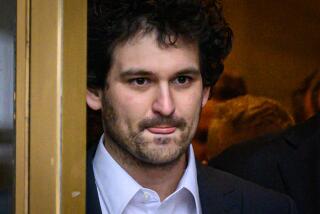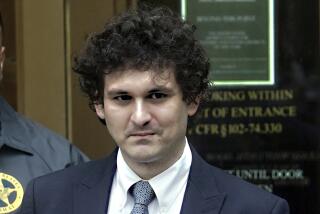Defense Targets Fastow’s Dealings
- Share via
HOUSTON — There was an odd reversal of roles in the Enron Corp. trial Thursday: Defense lawyer Daniel M. Petrocelli labored to show that many of government witness Andrew S. Fastow’s supposedly nefarious deals with Enron were legitimate, while Fastow clung doggedly to his guilt.
The reason was that Fastow had earlier implicated Petrocelli’s client, former Enron Chief Executive Jeffrey K. Skilling, in the deals, saying Skilling had encouraged him to create financial vehicles that would help Enron improperly hide losses and boost reported profit.
The vehicles were investment partnerships that Fastow -- with the consent of Enron’s top management and board of directors -- was allowed to control. He was permitted to reap millions of dollars of profit from the arrangements even though he retained his post as Enron’s chief financial officer.
Petrocelli, in his opening statement when the trial began six weeks ago and in the Fastow cross-examination, has tried to draw a sharp line between Fastow’s admitted looting of Enron -- which Fastow said he concealed from Lay and Skilling -- and the transactions between the Enron and the Fastow partnerships. Petrocelli contends that the latter were lawful and properly disclosed to investors and that Fastow wants to paint them in a criminal light only to please prosecutors by dragging Skilling down with him.
Thursday was the second day of cross-examination for Fastow, 44, who also has given damaging testimony against former Enron Chairman Kenneth L. Lay. Fastow said that Lay publicly portrayed the energy-trading company as healthy when he knew it was beset with financial problems.
Skilling, 52, and Lay, 63, face multiple fraud and conspiracy charges in their trial. The charges grew out of a federal investigation launched in the wake of Enron’s 2001 collapse, which erased thousands of jobs and billions of dollars of stock market wealth.
Fastow pleaded guilty in January 2004 to two conspiracy counts and agreed to serve 10 years in prison and forfeit $24 million.
Petrocelli’s main focus Thursday was the supposed side deals in which Skilling promised that Fastow’s investment partnerships would not lose money if they agreed to temporarily take some assets off Enron’s hands, such as a stake in a struggling Brazilian power company. The benefit for Enron was the ability to book a profit on the sale, but under accounting rules, it wouldn’t be a true sale if there was a secret no-risk guarantee.
Petrocelli spent hours questioning Fastow about the “Global Galactic Agreement,” a three-page handwritten document that Fastow said he created in 2000 to keep track of his growing list of improper verbal side deals with Skilling and Richard A. Causey, then Enron’s chief accounting officer. The document contains Fastow’s and Causey’s initials, but Fastow testified that he never showed the list to Skilling, and it doesn’t refer to Skilling by name.
One of Fastow’s notations indicated that Enron had agreed to repurchase the Brazilian investment, purportedly to make good on Skilling’s promise to protect the partnership from losses. But Petrocelli, trying to show there was nothing illegal about that, introduced official Enron documents from 2000 with almost identical wording. He said Enron at the time wanted to buy back all outside stakes in its international holdings so that it could bundle them together for a huge sale to a Middle Eastern sheik -- a sale that later fell through.
Fastow said he did not recall details of that planned sale.
Petrocelli seemed to question whether Fastow had manufactured the document years later in order to curry favor with prosecutors at a time when his wife, Lea, was awaiting sentencing for a crime connected to one of his crooked deals.
Lay’s chief defense lawyer, Michael W. Ramsey, will open his cross-examination of Fastow when the trial resumes Monday.
More to Read
Inside the business of entertainment
The Wide Shot brings you news, analysis and insights on everything from streaming wars to production — and what it all means for the future.
You may occasionally receive promotional content from the Los Angeles Times.










